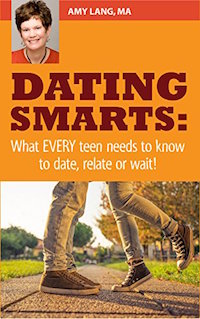Dating Smarts by Amy Lang
If you’re a parent to a pre-teen or teenager, buy this book. Read it. Have your child read it. Discuss it with them. Openly.
If you’re an aunt, uncle, grandparent, brother, sister, cousin, or close friend to someone with a pre-teen or teenager, buy this book for them.
I bought this for my middle school daughter to read, hoping to prepare her for dating (soon to begin, I’m sure). Anticipating open discussions with her, I read the book first.
I’d break down this book into two sections: relationships and sex.
1. Relationships
I wish I had had the section on relationships available to me when I was a teenager in the 80’s. Even if I hadn’t followed all of the suggestions, at least I would have known how unrealistic my expectations were.
Lang does a great job of talking to the reader in a comfortable manner about how to know if you’re ready to date, determining what’s important to you in a relationship, and simple ways to stand up for yourself when those things aren’t present.
Honestly, I know several adults who would benefit from reading this book.
2. Sex
57 out of 1,000 teenage girls become pregnant in the U.S each year. In Holland, the statistic is 5 out of 1,000. That’s a pretty big difference.
1 in 4 teenage girls in the U.S. has a sexually transmitted infection (STI).
That’s absolutely crazy; 25% of woman get a STI before the age of 20.
We have so many safe means of preventing pregnancy and STIs, yet we are horrible at communicating about these to our teenagers. Assuming that abstinence isn’t your only option (proven to not work, by the way), Lang does a wonderful job of discussing the other options.
She also provides many helpful suggestions and even scripts for handling the common, yet tricky, scenarios that teenagers often find themselves in while exploring their sexuality.
I recommend this book for both parents and their teens. Lang writes in an easy, conversational tone which should be accessible to young teens. She brings up all the topics parents might be afraid to, opening the door for conversations that might be uncomfortable, but are necessary to help your child have healthy romantic relationships.
